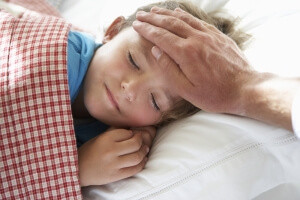
Is your student heading back to school soon? Check out these top tips for keeping your student healthy during the hectic back-to-school season!
Back to School time can be stressful for parents and kids. It marks the end of a more relaxed summer schedule and the beginning of a large to-do list. While scrambling to get it all done, parents may forget to prepare kids to battle illness and stay healthy.
Here are some of the five most common back-to-school health concerns doctors see before school kicks back into session:
1. What’s the best way to help my child adjust to a new back to school sleep schedule?
It’s best not to wait until the last minute to adjust your child’s sleep schedule, a gradual shift, 20 to 30 minutes two nights a week works best. It can take up to four weeks to get a child back on a sleep schedule for school. If you haven’t moved their bed time back yet, you can still gradually shift it back 10 minutes a night until they are back on the optimum sleep schedule to perform well in school. On average school-age children need between nine and 11 hours sleep per night, so for example, a 7-year-old who needs to get up at 6 a.m. for school, should be going to bed at around 8 p.m. to get ten hours of sleep.
2. How do illnesses spread so quickly among school children?
Colds and flu are typically spread through respiratory droplets. Viruses enter the body through eyes, mouth or nose. Coughing and sneezing can send thousands of infectious particles into the air. Not only can your child breathe these in, but some viruses can live on surfaces, like doorknobs, for several hours.
3.What’s the best way to prevent my child from getting sick?
Parents should vaccinate against common childhood illnesses. Frequent hand washing with soap and water is still the number one way to kill germs. Alcohol based hand sanitizer also works well when soap and water are not available. Antibacterial wipes are good for hard surfaces. Parents should show children how to properly wash their hands and remind them to do so before eating, after using the bathroom and after playing. Also, getting a good night’s rest can boost a child’s immune system.
4. How sick is too sick to send my child to school?
A child should stay home if they have a fever, diarrhea or vomiting, or if they seem lethargic or just not themselves. Not only can their illness get worse by being around so many other kids and germs, but they can also make others sick.
5. How can I reduce my child’s back to school butterflies/anxiety?
Children can be nervous about everything from changing schools and making friends to adjusting to a new teacher and heavy homework load. You can help by managing your own anxiety. Talk with your child about what’s making them nervous and don’t minimize their concerns. Focus on the positive and don’t over-schedule your child. If a child’s worries seem to go beyond the normal jitters or last for a long period of time, speak with your child’s pediatrician to see if something more is going on.
This article was originally published on WATE.com






